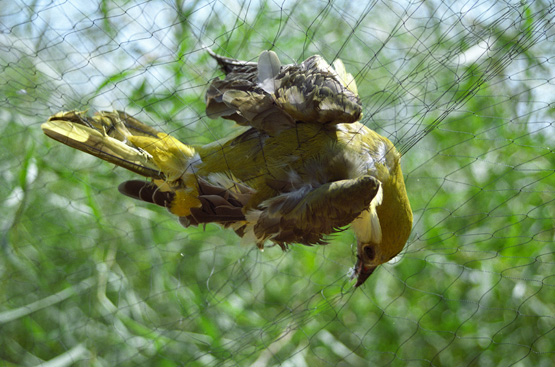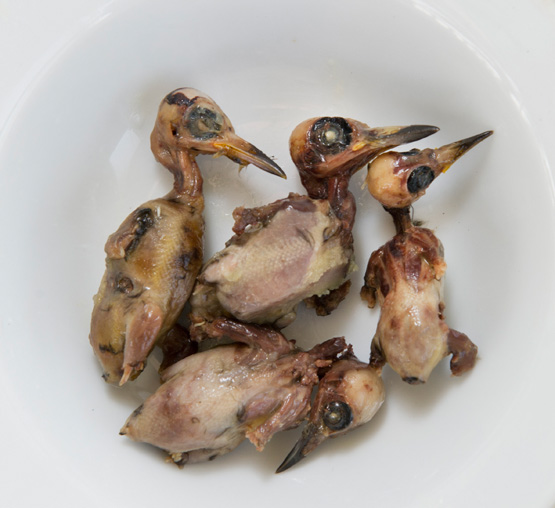
Golden Oriole Oriolus oriolus, caught in a net, Cyprus. Photo: RSPB images
Illegal songbird trapping in Cyprus at ten year low on UK military base
Latest report suggests a continued decline in the number of birds being illegally killed on British military base in Cyprus.
The continued reduction is due in large part to work by the RSPB, BirdLife Cyprus and the Sovereign Base Area Administration using covert surveillance methods to catch trappers in the act, leading to stronger court sentences.
Killed songbirds are sold via the black market to restaurants in the Republic of Cyprus for diners to eat, with criminal gangs earning hundreds of thousands of Euros from this illegal activity.
An estimated 121,000 songbirds, such as blackcaps and robins, are estimated to have been illegally killed on a British military base in Cyprus last autumn, according to a new report by BirdLife Cyprus and the RSPB. However, this number was down from 260,000 in 2017 and 880,000 in 2016.
The success in the reduction of illegal trapping on the base is believed to be primarily due to the impact of covert surveillance work undertaken by the RSPB and BirdLife Cyprus with the Sovereign Base Area (SBA) Administration. Since the work started in 2016, some 21 trappers have been caught on camera and prosecuted, with courts imposing three years suspended jail sentences and fines as high as 6000 Euros. More individuals caught in 2018 are due to appear in court later this year. The Committee Against Bird Slaughter (CABS) have also continued to provide crucial support in identifying trapping sites as highlighted by TV Presenter and campaigner, Chris Packham, during the last three autumns.Along with increased enforcement and heavier sentences, the SBA authorities are also using a range of civil and criminal sanctions against the trappers meaning they now face a double deterrent.
Songbirds are illegally trapped and killed to provide restaurants with the main ingredient for the local and expensive delicacy of ambelopoulia – a plate of cooked songbirds. Organised criminal gangs are driving this illegal activity on a huge scale and it is estimated they earn hundreds of thousands of Euros every year from the songbirds they kill on British territory.
Birds are trapped using nets placed between acacia bushes and within orchards, and speakers playing bird calls are used to attract birds down as they migrate.The UK Government now needs to ensure invasive tree removal operation continues if this success is to be sustained, whilst Republic of Cyprus must crackdown on black-market restaurants which still serve songbirds.
Martin Harper, RSPB Conservation Director, said: ‘This continued success is thanks to a great collective effort by many determined people. We are particularly delighted to see such positive results from our on-the-ground work with Sovereign Base Area staff.
However, we must not be complacent. We now need to finish removing the remaining non-native acacia bushes to make sure that there are no longer places where trappers can hide their nets. This is the long-term solution needed for these migrant birds.
The Sovereign Base Area authorities should be congratulated for making use of a wide range of criminal and civil sanctions, such as exclusion orders and vehicle impoundments, to ratchet up the pressure on the bird trapping community, and undertaking the removal of the irrigation infrastructure.‘.
Martin Hellicar, Director of BirdLife Cyprus, said: ‘The last few years have brought a significant reduction in bird trapping levels in the British bases. This is thanks to far more effective enforcement by the SBA Police, plus the building of a real partnership with conservation NGOs that amounts to a real showcase of how such working together can bring tangible results on the ground.The sour note is this year’s increase in trapping levels within the Republic. We are pushing for the adoption of a much stronger collaborative approach with NGOs, to avoid a reversal of the progress achieved in previous years.‘.
Small-scale trapping of songbirds for human consumption in Cyprus was practiced for many centuries, but it has been illegal on the island for over 40 years, after being outlawed in 1974. Enforcement against restaurants serving ambelopoulia has been very limited in the last few years, yet as the key reason for this illegal activity it is crucial that urgent action is taken by the Cyprus Government as well as by the Ministry of Defence.ENDS

Ambelopoulia (means birds of the vineyards) small migratory birds prepared for eating (mainly Blackcaps but also Lesser Whitethroat and Great Reed Warbler), Cyprus, September. Photo: David Tipling/RSPB images
[registration_form]
Encouraging news, but the RSPB has no reason to grab the lion’s share of the credit for the progress on this.
The real heroes are the Committee Against Bird Slaughter whose volunteers remove illegal nets, challenge offenders and provide evidence for prosecutions.
Sometimes they do so at considerable personal risk.
Credit also to Chris Packham for his work in publicising the issue.
As far as I can make out, the RSPB’s contribution to the campaign has been modest at best.
Brilliant work by all concerned, including the RSPB, Cyprus Birdlife, Chris Packham, the police and all the volunteers.
Now is not the time to say who has done more or who has done less. The important thing is that this foul and criminal activity is being reduced significantly on the UKs Sovereign Air Base and we must salute all those involved in achieving this.
The next step is to ensure these criminal activities do not surface elsewhere in the Republic of Cyprus
Sorry James
But I am afraid I don’t agree with your assessment. I have been involved with bird trapping issues in Cyprus for the RSPB since 2000, was involved in setting up the monitoring survey in 2002 (since taken on by BirdLife Cyprus) and have been out there the last three autumns working with SBA police on the covert surveillance project. Nobody would dispute the astonishing work undertaken by CABS on Cyprus since 2008 and similar work in many other countries. I know several CABS staff & volunteers and would agree a lot of their efforts are indeed heroic. However, in relation to the specific issue of the fall in illegal bird trapping on the British Eastern Sovereign Base Area – I have no doubt the primary driver of this has been the covert surveillance project by BLC, RSPB and the SBA authorities run since 2016. In addition to the significant increase in penalties, this work has been a catalyst for a range of civil and criminal sanctions by the SBA authorities- some of which were proposed by the RSPB. There is still a significant bird trapping problem on Cyprus but this is good news – and fair credit is due to the SBA authorities and all the NGOs who have worked on this problem
Hats off to you, Guy, for your involvement in the important work being done. I don’t wish to minimise the significance of your initiatives.
However, my feeling is that while the RSPB provides expertise and advice, most of the courage and on-the-ground work comes from the CABS who are consistently at the sharp end, with their volunteers not infrequently putting their lives at risk in confronting criminals who may be armed.
The RSPB press release should have been far more generous in commending the work of these volunteers.
Sadly, the RSPB has long lost the fervour and campaigning zeal of its founders. Its leadership has surely never been weaker than it is now.
Its role in efforts to protect nightingales in Kent, stone curlews in Norfolk and hen harriers on moorland is peripheral to the work done by others.
Over the past 60 years, the organisation has been lame in its efforts to save farmland birds, with the result that populations have crashed.
A similar fate probably beckons for many of our seabirds because of its wishy-washy, vacillating policies on offshore wind.
Time to stop – I seem to have wandered off the subject!